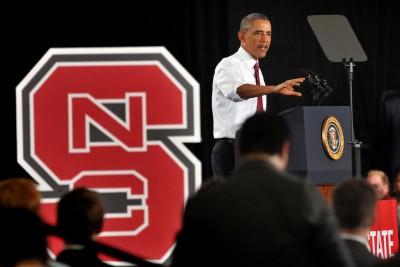RALEIGH — A provision in the Senate’s version of the budget would prohibit the state from applying for federal grants aimed at energy planning, efficiency and spurring cleaner technologies.
The move is one of the latest in a session that has seen considerable contention over the direction of state energy policy.
Supporter Spotlight

Sen. Andrew Brock, R-Davie, an appropriations co-chair for the Department of Environment and Natural Resources portion of the budget, said Wednesday the provision was added because the grants come with too many strings attached.
“One of the things we talked about was that when you apply for certain grants, stipulations that came along with the grant would make you do things that would have a negative cost impact to the state,” Brock said.
He said some of the products of past energy grant-funded work were not well thought out. He pointed to efficiency initiatives for state building codes, which he said have cost some businesses more than they have saved and have cost jobs in his district.
In a year where the legislature has heaped extra scrutiny on both federal regulations and renewable energy policy, the move is not a surprise.

Rep. Pricey Harrison, D-Guilford, said the provision killing the grant program doesn’t make any sense considering the burst in job growth the state has seen from renewables and clean manufacturing businesses. It does make sense, she said, given the political fights over energy policy, including this week’s passage by the Senate of a bill prohibiting the state from cooperating with new Environmental Protection Agency Clean Power Plan.
Supporter Spotlight
“It’s consistent with the majority party’s attitude toward renewables and clean energy,” Harrison said of the grant cutoff.
Examples of Grants
The Senate’s provision would prohibit the State Energy Office from applying for any more grants under two Department of Energy programs, the State Energy Program, or SEP, Competitive Grant Program and the Clean Energy and Manufacturing Initiative.
According to the State Energy Office, North Carolina received SEP grants in 2013 and 2014.
From the 2013 grant, the state shared $400,000 in regional planning funds to study for economic benefits and other effects of clean energy manufacturing and energy-related jobs in sectors such as alternative-fuel vehicles, biofuels, energy efficiency, energy storage and solar and wind power.
The 2014 grant awarded $425,000 in funds to plan and develop energy coordination between North and South Carolina. The program is being administered in part through the University of North Carolina at Charlotte, but so far, none of the grant funds have been used, according to the energy office, which administers the grants program.
Another grant for the 2015 cycle, which is aimed at studying energy-efficient lighting, heating and air conditioning and insulation, is pending.

North Carolina reaped its biggest grant under the Clean Energy and Manufacturing Initiative, which explores new materials, technologies and manufacturing processes. That funding, announced in January 2014 during a visit to N.C. State by President Barack Obama, provides a $70 million matching grant to $70 million in privately raised money over five years for the Next Generation Power Institute at the university.
Betsy McCorkle, director of government affairs for the N.C. Sustainable Energy Association, an advocacy group that has been working to raise awareness about the programs, said the N.C. State institute is a good example of how the grants can work for the state. The project, she said, has helped propel the state to the forefront of clean manufacturing and energy-efficiency research.
“This is the home of the institute,” McCorkle said. “It’s all happening here. We are training people here.”
McCorkle said that although the provision affects only future grants and would not stop current projects, the worry is that a ban on applications would lead to a shift in future federal resources away from the state.
“Those grants aren’t going away,” she said. “If they don’t go to North Carolina they’ll go to another state.”
So far, DENR officials have declined to take a public position for or against the Senate provision.
Harrison said she doesn’t know if the provision will survive negotiations in the House and Senate budget committee. Appropriations committee members from both chambers have yet to begin regular meetings while negotiators work out a compromise revenue plan. The current, temporary spending for the state ends Aug. 14.







